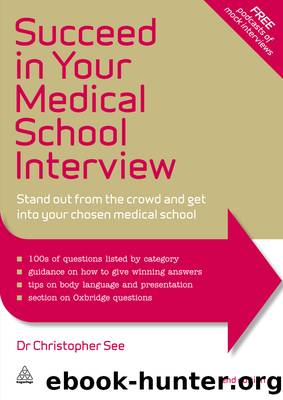Succeed in Your Medical School Interview by Christopher See

Author:Christopher See
Language: eng
Format: epub
Publisher: Kogan Page
Points to note
The example answer to question 71 has several key points that help the candidate to communicate value. It uses cadence to guide the admissions tutors into certain areas, particularly towards an ethics discussion around medical consent. Cadence does not only apply to the end â for example this answer mentioned the on-call shifts that were discussed with junior doctors on work experience, and the candidate might move on to talk about these, or follow on more naturally from the end of the answer into ethical dilemmas, such as âWhat is your opinion on euthanasia? What is its legal status in the UK?â
Learning task
Ask the doctors you meet what they do and donât enjoy about their job. Remember to write these down on the same day that you hear them and think about what they have said. Ask yourself, are you really looking forward to these challenges or rewards? Or do they put you off such a career? By reflecting on what you have discussed, you can start to convince yourself that medicine is, or is not, the career for you, and convincing yourself is the first step towards giving a genuine and convincing answer to an interview panel.
72. What do you think will be the positive aspects and the negative aspects of being a doctor?
You may wish to include the following.
Positive aspects
Rewarding work
âI should say in no uncertain terms that the work of a doctor is immensely rewarding. It is a pleasure to be involved in the health care of others, and you feel that you are making a hands-on and active contribution to society. Although the stories that make news headlines often involve disgruntled patients and lawsuits, the day-to-day reality is that most patients and their families are very grateful to the doctors who look after them.â
Human interaction
There are many jobs that involve a great deal of human interaction, and medicine is one of them. In almost every discipline there is a positive need to talk to people on a daily basis, which gives variety and interest. This varies from patients to other doctors, as well as other members of the health care team.
If you enjoy a hands-on career â as one student described it, âIâd like to be a human body engineerâ â then not only is surgery an attractive option, but other branches of medicine are increasingly having procedure-based activity, such as bronchoscopy for respiratory physicians and gastroscopy for gastroenterologists (using flexible optical fibre cameras to investigate the lungs or stomach from the inside).
Defined career path
The current career path is set out by the NHS Modernising Medical Careers team, which gives a degree of predictability in how your training will develop. There are also opportunities for gap years and âTime Out of Trainingâ for pursuits such as research or to pursue personal goals such as sporting or business endeavours.
The 2014 figures for basic annual salary were around £22,636 for FY1 doctors and £28,076 for FY2 doctors, although these can be increased by up to 50 per cent depending on the hours of work and on-call commitments.
Download
This site does not store any files on its server. We only index and link to content provided by other sites. Please contact the content providers to delete copyright contents if any and email us, we'll remove relevant links or contents immediately.
| Administration | Adult & Continuing Education |
| Business School Guides | College Guides |
| Financial Aid | Graduate School Guides |
| Law School Guides | Medical School Guides |
| Test Preparation | Vocational |
Spare by Prince Harry The Duke of Sussex(5172)
Navigation and Map Reading by K Andrew(5147)
Tuesdays with Morrie by Mitch Albom(4762)
Machine Learning at Scale with H2O by Gregory Keys | David Whiting(4289)
Cracking the GRE Premium Edition with 6 Practice Tests, 2015 (Graduate School Test Preparation) by Princeton Review(4270)
Never by Ken Follett(3928)
Goodbye Paradise(3795)
What It Really Takes to Get Into Ivy League and Other Highly Selective Colleges by Hughes Chuck(3737)
Fairy Tale by Stephen King(3364)
Harry Potter and the Prisoner of Azkaban (Book 3) by J. K. Rowling(3346)
Pledged by Alexandra Robbins(3167)
Kick Ass in College: Highest Rated "How to Study in College" Book | 77 Ninja Study Skills Tips and Career Strategies | Motivational for College Students: A Guerrilla Guide to College Success by Fox Gunnar(3108)
Reminders of Him: A Novel by Colleen Hoover(3067)
A Dictionary of Sociology by Unknown(3065)
Sapiens and Homo Deus by Yuval Noah Harari(3057)
The Social Psychology of Inequality by Unknown(3013)
Graduate Admissions Essays, Fourth Edition: Write Your Way into the Graduate School of Your Choice (Graduate Admissions Essays: Write Your Way Into the) by Asher Donald(2903)
Will by Will Smith(2898)
Zero to Make by David Lang(2774)
